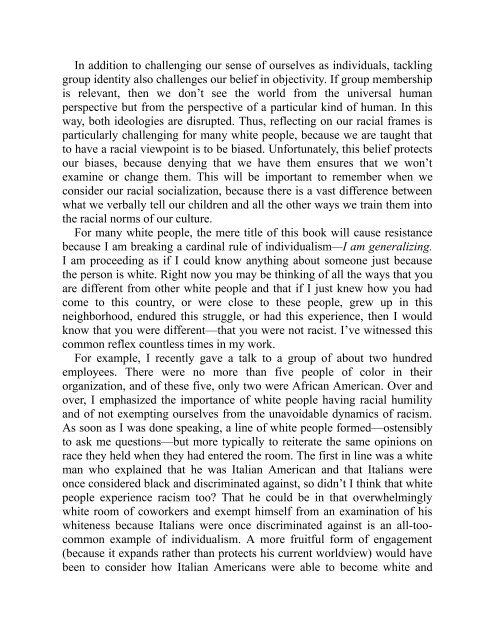You also want an ePaper? Increase the reach of your titles
YUMPU automatically turns print PDFs into web optimized ePapers that Google loves.
In addition <strong>to</strong> challenging our sense of ourselves as individuals, tackling<br />
group identity also challenges our belief in objectivity. If group membership<br />
is relevant, then we don’t see the world from the universal human<br />
perspective but from the perspective of a particular kind of human. In this<br />
way, both ideologies are disrupted. Thus, reflecting on our racial frames is<br />
particularly challenging <strong>for</strong> many white people, because we are taught that<br />
<strong>to</strong> have a racial viewpoint is <strong>to</strong> be biased. Un<strong>for</strong>tunately, this belief protects<br />
our biases, because denying that we have them ensures that we won’t<br />
examine or change them. This will be important <strong>to</strong> remember when we<br />
consider our racial socialization, because there is a vast difference between<br />
what we verbally tell our children and all the other ways we train them in<strong>to</strong><br />
the racial norms of our culture.<br />
For many white people, the mere title of this book will cause resistance<br />
because I am breaking a cardinal rule of individualism—I am generalizing.<br />
I am proceeding as if I could know anything about someone just because<br />
the person is white. Right now you may be thinking of all the ways that you<br />
are different from other white people and that if I just knew how you had<br />
come <strong>to</strong> this country, or were close <strong>to</strong> these people, grew up in this<br />
neighborhood, endured this struggle, or had this experience, then I would<br />
know that you were different—that you were not racist. I’ve witnessed this<br />
common reflex countless times in my work.<br />
For example, I recently gave a talk <strong>to</strong> a group of about two hundred<br />
employees. There were no more than five people of color in their<br />
organization, and of these five, only two were African American. Over and<br />
over, I emphasized the importance of white people having racial humility<br />
and of not exempting ourselves from the unavoidable dynamics of racism.<br />
As soon as I was done speaking, a line of white people <strong>for</strong>med—ostensibly<br />
<strong>to</strong> ask me questions—but more typically <strong>to</strong> reiterate the same opinions on<br />
race they held when they had entered the room. The first in line was a white<br />
man who explained that he was Italian American and that Italians were<br />
once considered black and discriminated against, so didn’t I think that white<br />
people experience racism <strong>to</strong>o? That he could be in that overwhelmingly<br />
white room of coworkers and exempt himself from an examination of his<br />
whiteness because Italians were once discriminated against is an all-<strong>to</strong>ocommon<br />
example of individualism. A more fruitful <strong>for</strong>m of engagement<br />
(because it expands rather than protects his current worldview) would have<br />
been <strong>to</strong> consider how Italian Americans were able <strong>to</strong> become white and


















